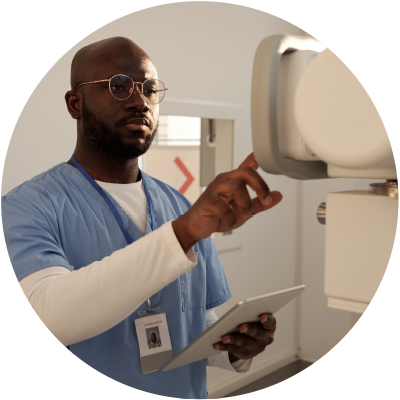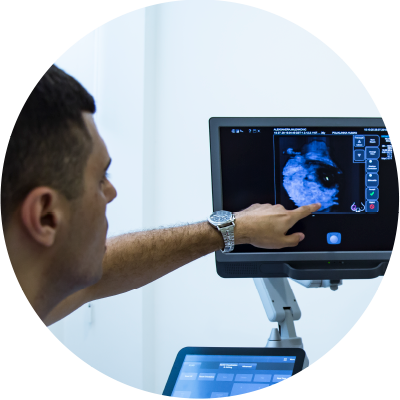Become an Ultrasound Technician
Diagnostic Medical Sonography (Ultrasound) Technician
The Diagnostic Medical Sonography Program is designed to thoroughly prepare the student, through quality lecture, laboratory, and clinical externship instruction in the theoretical knowledge, skills, and responsibilities required to work in the allied medical field as an entry level general sonographer. The successful program graduate will be able to perform appropriate ultrasound scanning examinations and procedures, and record anatomic, pathologic, and/or physiologic data for interpretation by a physician. The graduate will also be able to obtain, review, and integrate pertinent patient history and supporting clinical data to facilitate optimum diagnostic results. In addition, the graduate will be prepared to exercise discretion and judgment in the performance of sonographic diagnostic services, provide appropriate and compassionate patient care for patients undergoing ultrasound examinations, demonstrate excellent communication skills with patients and other health care professionals, and act in an ethical and professional manner.
Why a Career in Ultrasound?
The field of Diagnostic Medical Sonography (Ultrasound) has grown significantly over the past 3 decades and rapidly developing the technology used for medical procedures. According to the Bureau of Labor Statistics, growth is projected to continue in the future with employment opportunities in urban and rural areas across the nation with an increase in demand and popularity of 14 percent for the next 8 years. Typical areas of employment include clinics, hospitals, private physician offices, imaging centers and laboratories. Extensive advancement opportunities exist in areas of education, research or as technical advisors.
Diagnostic Medical Sonography (Ultrasound) can be right for you if:
- You are social and compassionate and care about the well-being of people in medical need.
- You are fascinated by technological advancements in medicine.
Program Objectives
Upon completion of the program, the successful student will be able to:

Obtain, review, and integrate pertinent patient history and supporting clinical data to facilitate optimum diagnostic results.

Pre-select the ideal settings for equipment to best get the results needed.

Record, analyze, and process diagnostic data and other pertinent observations made during the procedure for presentation to the interpreting physician.

Exercise discretion and judgment in the performance of medical sonography.

Demonstrate appropriate communication skills with patients, colleagues and physicians.

Act in a professional and ethical manner.

Provide patient education related to medical sonography and promote principles of good health.
Q&A of Becoming a Diagnostic Medical Sonographer (Ultrasound Technician)
Do I need a High School Diploma to register in the ultrasound program?
Yes. Having obtained basic General Education from an accredited and verifiable institution, shows you have a basic level of comprehension to absorb the information given in lectures and during lab practice. There are ways you can still achieve your High School or GED education while enrolled at NPC but it really depends on your academic history. Every case is different and it is highly recommended that you speak to an admissions representative to help create the right path towards your success.
Do I need an Associate Degree to become an Ultrasound Technician?
An Associate Degree is only required if you are seeking American Registry of Radiologic Technologists (ARRT) Certification in ultrasound. The American Registry of Diagnostic Medical Sonographers (ARDMS) does not require a degree to obtain a certification. However, ARMDS has more than one pathway to be eligible for certification. Having an Associate Degree may give you an upper hand by shortening the length of some requirements and help you obtain multiple certifications. In turn, having more than one certification (ARRT and ARMDS) may offer more employment opportunities.
Is a license required to become an Ultrasound Technician?
This is a big no. Unlike many other professions in the medical field, the State of California does not issue licenses for Ultrasound Technicians and does not require obtaining a certification in order to be employed. Be wary of any institution which informs you a “license” is required. On the other hand, not having a certification from registries like ARRT or ARDMS reduces your chances of obtaining considerable employment opportunities. Obtaining any of these certifications is not as easy as simply attending school and it requires trained professionals who know the certification process to ensure you reach your ultimate goal.
How long is the program at NPC and why do different schools have ultrasound programs that vary in length?
The length of any Medical Sonography program depends on class schedule and thoroughness of the program. Depending on your academic history, and type of completion award, the entire program at NPCollege can take between 24-27 months in order to fully prepare you for externship, registry testing, and future employment challenges.
Can I transfer credits from another school to take the ultrasound program at NPCollege?
Yes. You may transfer General Education credits towards an associate degree from your current or prior accredited college. You may also challenge some of the ultrasound introductory classes for additional credits. To do this, you can submit your prior school’s unofficial transcripts or proof of past related work experience for an evaluation.
Please visit the California Code of Regulations Title 17 for additional information about Radiation Regulations.
Program Completion Time
Diploma — 23 months / 94 weeks / 2360 hours
Associate Degree — 26 months / 106 weeks / 2630 hours
Get Started Today!
By clicking Submit, I expressly authorize National Polytechnic College to contact me regarding educational services via email, telephone or text at the email address and phone numbers provided. I understand this is not required to attend National Polytechnic College. MSG & Data rates may apply. Message frequency may vary. To unsubscribe reply STOP and to get assistance reply HELP. Find our Privacy Policy at https://npcollege.edu/privacy-policy